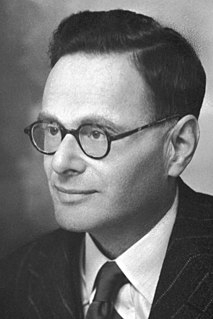A Quote by Francis Bacon
Again there is another great and powerful cause why the sciences have made but little progress; which is this. It is not possible to run a course aright when the goal itself has not been rightly placed.
Related Quotes
The main object of the work was to present such a survey of the advances already made in physical knowledge, and of the mode in which they have been made, as might serve as a real and firm basis for our speculations concerning the progress of human knowledge, and the processes by which sciences are formed.
I am ready to talk today. I have been in a great many councils, but I am no wiser. We are all sprung from a woman, although we are unlike in many things. We can not be made over again. You are as you were made, and as you were made you can remain. We are just as we were made by the Great Spirit, and you can not change us ; then why should children of one mother and one father quarrel ? — why should one try to cheat the other ? I do not believe that the Great Spirit Chief gave one kind of men the right to tell another kind of men what they must do.
Poverty, we may say, surrounds a man with ready-made barriers, which if they do mournfully gall and hamper, do at least prescribe for him, and force on him, a sort of course and goal; a safe and beaten, though a circuitous, course. A great part of his guidance is secure against fatal error, is withdrawn from his control. The rich, again, has his whole life to guide, without goal or barrier, save of his own choosing, and, tempted, is too likely to guide it ill.
"The Universe repeats itself, with the possible exception of history." Of all earthly studies history is the only one that does not repeat itself. ... Astronomy repeats itself; botany repeats itself; trigonometry repeats itself; mechanics repeats itself; compound long division repeats itself. Every sum if worked out in the same way at any time will bring out the same answer. ... A great many moderns say that history is a science; if so it occupies a solitary and splendid elevation among the sciences; it is the only science the conclusions of which are always wrong.
Tulips come up in spring for no reason. Of course, you planted bulbs and now in April the earth warms up. But why? For no reason except gravity. Why gravity? For no reason. And why did you plant red tulip bulbs to begin with? For beauty, which is itself and has no reason. So the world is empty. Things rise and fall for no reason. And what a great opportunity that is! You can start writing again at any minute. Let go of all your failures and sit down and write something great. Or write something terrible and feel great about it.
The science of logic never made a man reason rightly, and the science of ethics never made a man behave rightly. The most such sciences can do is to help us to catch ourselves up and check ourselves, if we start to reason or to behave wrongly; and to criticise ourselves more articulately after we have made mistakes.
In one sense, reading is a great waste of time. In another sense, it is a great extension of time, a way for one person to live a thousand and one lives in a single lifespan, to watch the great impersonal universe at work again and again That is why I read: I want everything to be okay. That’s why I read when I was a lonely kid and that’s why I read now that I’m a scared adult.
Times have changed, and science has made great progress, and so has our work; but our principles have only been confirmed, and along with them our conviction that mankind can hope for a solution to its problems, among which the most urgent are those of peace and unity, only by turning its attention and energies to the discovery of the child and to the development of the great potentialities of the human personality in the course of its formation.
The incredible story of progress that is America has always been built by those who ask why, what if, and why not. Our schools must begin instilling that wonder in our children again so that their generation will unite around the next great project of our time, whether it be declaring America energy independent or launching the next great technological revolution.
The reason why you do history, and particularly why you do war, is that you want to make sure that in the next war, some lessons were learned. There's a saying: "History doesn't repeat itself, but it does rhyme." Or Ecclesiastes: "What has been will be again. What has been done will be done again." Human nature always superimposes itself - its strength and its frailty over the rush of chaos of ongoing events - and we can perceive patterns and themes and motifs.








































